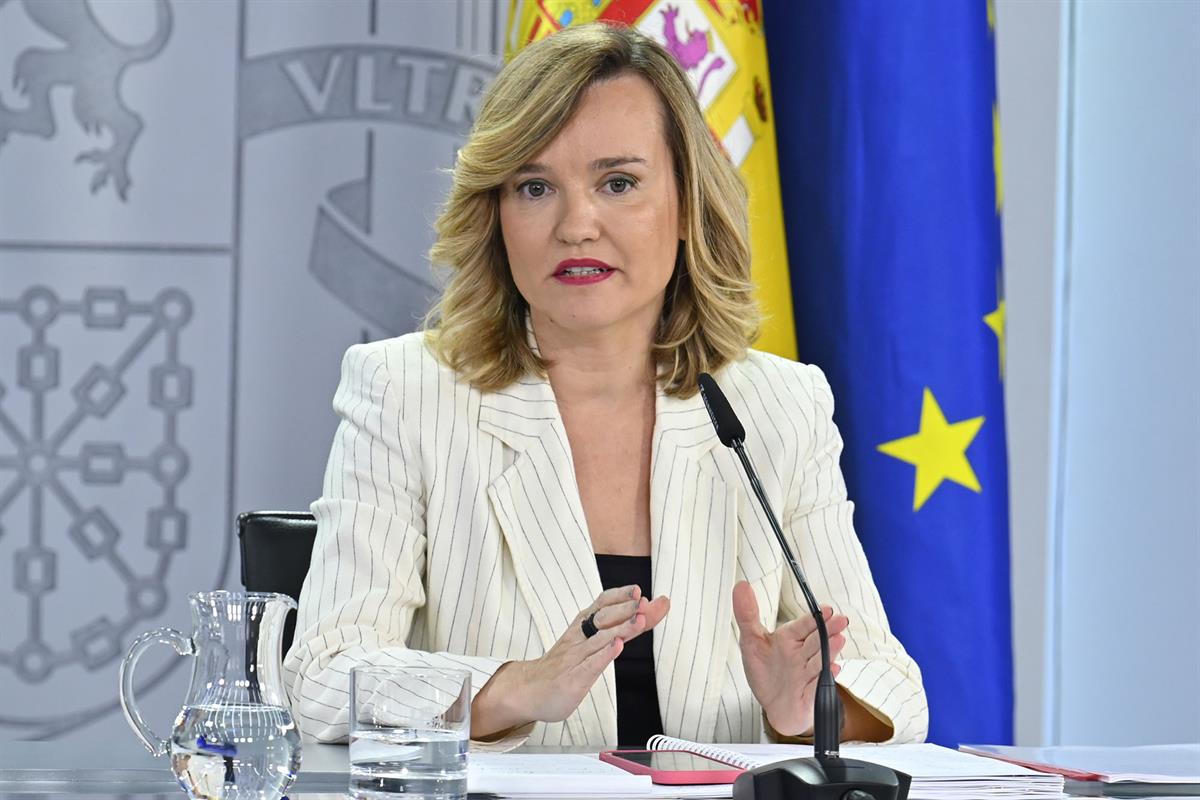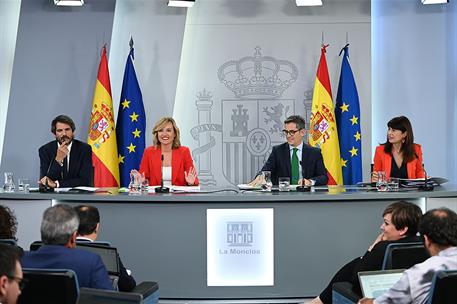Moncloa Palace, Madrid
The Minister for Home Affairs, Fernando Grande-Marlaska, along with Minister for Education, Vocational Training and Sports and Government Spokesperson, Pilar Alegría, at the press conference after the Council of Ministers (Pool Moncloa / Jose Manuel Álvarez)
The Council of Ministers has approved the modification of the Organic Law on the General Electoral System, which now begins its parliamentary process. Once the mandatory hearing and public information procedures have been completed and the corresponding reports received, the regulation will be sent to the General Courts with minor modifications with respect to the initial text.
According to the Minister for Home Affairs, Fernando Grande-Marlaska, the aim of the reform is to strengthen Spanish democracy. "We enjoy a solid, firmly established and guaranteeing system, but the fact that Spain is a full and consolidated democracy does not mean we can stop taking steps to perfect and further strengthen our system," he said. The minister also stressed that the amendment is in line with the recommendations made by the European Commission in 2020 and 2023 to improve the transparency of European democratic systems.
The Minister for Home Affairs recalled that the Action Plan for Democracy, approved on 17 September, included these recommendations from the European Commission, specifically contemplating two obligations aimed at strengthening the transparency of the legislative power and the electoral system. The first is to hold election debates between candidates, and the second, to publish all micro-data from election polls, duly anonymised. The draft law approved by the Council of Ministers incorporates both proposals into the electoral legislation.
Electoral debates in the public media
The Minister for Home Affairs, Fernando Grande-Marlaska, at the press conference after the Council of Ministers | Pool Moncloa / Jose Manuel Álvarez
Regarding debates, the reform requires publicly owned media to organise at least one debate during the election campaign. According to Grande-Marlaska, this obligation is already included in the electoral legislation of some communities, such as Castilla y León, Murcia and the Basque Country, and is also planned to be regulated in the Statute of Autonomy of Andalusia.
The minister for home affairs stressed that the imposition does not apply to privately owned media, which are not denied this possibility either. "As in the past, they can schedule debates while respecting the same principles that govern public media: political pluralism, news neutrality, equality and proportionality," he explained.
The rule, he added, obliges the candidates of the political formations that obtained electoral representation in the previous equivalent elections to attend the debates organised by the public media, unless they are prevented from doing so by a justified cause, the assessment of which will be the responsibility of the competent electoral board. For their part, the media must inform the political parties of the debates they are going to broadcast at least 5 days in advance.
Another important novelty of the draft is that it includes the participation of the so-called "significant political groups", thereby incorporating the doctrine of the Central Electoral Board. This designation refers to political formations, which despite not having stood in previous equivalent elections or not having obtained representation in them, have nevertheless obtained at least 5% of the valid votes cast in subsequent electoral processes and in the territorial scope of the media outlet. "The measure strengthens pluralism and aims to ensure that the media offer citizens - voters, in short - information that reflects as faithfully as possible the electoral scenario at all times," said Fernando Grande-Marlaska.
Access to election polling micro-data
The Minister for Home Affairs, Fernando Grande-Marlaska, during his speech at the press conference after the Council of Ministers | Pool Moncloa / Jose Manuel Álvarez
Another key aspect of the reform is the requirement that polls and surveys published during election campaigns allow access to their microdata files, which are the individual data of a statistic.
As the minister for home affairs explained, each survey must now be accompanied by a date specifying the entity that carried it out, the technical characteristics, the full text of the questions asked, and the number of people who did not answer each of them. After the adoption of the reform, microdata files should also be openly accessible, while preserving the confidentiality of this information.
"The consultation of the micro-data, suitably anonymised, will allow citizens and public and private entities to check the results of the survey and extract their own estimates," said Grande-Marlaska.
More collaboration between local police and justice against multi-recidivism
The Minister for Education, Vocational Training and Sports and Government Spokesperson, Pilar Alegría, has reported on the approval by the Council of Ministers of the royal decree that updates the System of Administrative Records to Support the Administration of Justice (SIRAJ). The main objective of this update is to speed up judicial management and strengthen collaboration between police forces and the judiciary to tackle the phenomenon of multi-recidivism.
 The Minister for Education, Vocational Training and Sports and Government Spokesperson, Pilar Alegría, at the press conference after the Council of Ministers | Pool Moncloa / Jose Manuel Álvarez
The Minister for Education, Vocational Training and Sports and Government Spokesperson, Pilar Alegría, at the press conference after the Council of Ministers | Pool Moncloa / Jose Manuel Álvarez
As Alegría explained, the change will basically allow the local police in the most populated municipalities to access the SIRAJ, the state database that collects information on precautionary measures, requests and sentences imposed by the judicial bodies with criminal jurisdiction. Until now, the local police, who are responsible for most theft arrests, did not have access to this system, so they could not know whether the person arrested already had a previous record for the same offence or the amount stolen.
The government spokesperson added that this development is complemented by the creation of new courts and the strengthening of police coordination to improve judicial efficiency.
Declaration of events of exceptional public interest
The Council of Ministers has declared a number of cultural and sporting events as events of exceptional public interest. The spokesperson cited as examples of initiatives to be included in this category the preparation of the next Olympic and Paralympic Games in Los Angeles in 2028, the commemoration of the Year of Tàpies, the Jacobean Holy Year 2027, and the anniversary of the BBK Live music festival.
Alegría indicated that with this declaration tax incentives are established for entities that collaborate in the private financing of this type of events, thereby facilitating their development in Spain.
Current affairs: fires and Ukraine conference in Rome
The Minister for Education, Vocational Training and Sports and Government Spokesperson, Pilar Alegría, during her speech at the press conference after the Council of Ministers | Pool Moncloa / Jose Manuel Álvarez
The spokesperson of the Executive began her speech at the press conference by sending a message of support to all those affected by the forest fire in the town of Paüls (Tarragona). "We would like to express our solidarity with the 18,000 residents who have had to be confined, and also of course, our gratitude to the people who are working in the fire-fighting and emergency tasks," said the minister, who stressed that the next few hours are key in the fire-fighting work.
Alegría also confirmed that troops from the Military Emergency Unit (UME) have arrived from Zaragoza and Valencia to work in collaboration with the Generalitat's fire brigade. At this point, the minister also expressed condolences on behalf of the Government to the families of the two people who died on 1 July in the fire in Lleida. "We are in the middle of an anti-fire campaign in a summer marked by high temperatures and with a significant presence of vegetation after the rains of this spring, and therefore we want to call for extreme caution and ask the public to notify 112 immediately should you become aware of an incident of this type," he instructed.
Last, Pilar Alegría referred to the forthcoming international trip of the President of the Government, who will travel to Rome on 10 July to take part in the 4th Conference for the Reconstruction of Ukraine, a forum in which the leader of the Executive "will reiterate Spain's solidarity and unconditional support for the Ukrainian people", as well as "the need to achieve a just and lasting peace".
Non official translation





